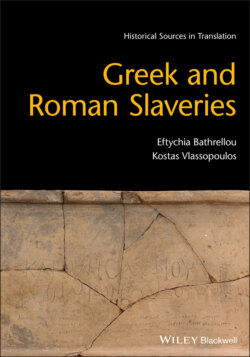Читать книгу Greek and Roman Slaveries - Eftychia Bathrellou - Страница 34
1.23 Digest, 1.6.1–2: Collection of Latin Juristic Texts (Sixth Century CE)
ОглавлениеOn the Digest, see 1.2.
Literature: Härtel 1977; Knoch 2017: 111–18.
Gaius, Institutes, Book 1:
Slaves are under the power (potestas) of their masters. This power is derived from the law of nations, for we can observe that equally among all nations masters have had power of life and death over their slaves. Whatever acquisition is made via the slave is made by the master. In our times, however, no man who is a subject of the Roman Empire is permitted to act against his slaves with excessive brutality and without a cause acknowledged by the laws. For, through an enactment of the divine (emperor) Antoninus, one who kills his own slave without cause is to be punished in the same way as one who has killed the slave of another. But even excessive harshness of masters is also curbed via an enactment of the same emperor.
Ulpian, On the Duties of the Provincial Governor, Book 8:
If a master acts brutally against his slaves or forces them to indecency and disgraceful violation, the tasks of the governor are stated in the rescript addressed by the divine Antoninus Pius to Aelius Marcianus, the governor of the province of Baetica. The terms of this rescript are the following: “It is certainly proper that the power (potestas) of the masters over their slaves be unimpaired and that no man’s rights be taken from him. However, it is in the interest of the masters not to deny relief to those who justly implore for help against brutality or starvation or intolerable insult. For this reason, investigate the complaints of the slaves of the household of Julius Sabinus who fled and took refuge at my statue. If you find that they have been treated more harshly than is fair or subjected to infamous insult, order that they be sold on the condition that they may not come back under the power (potestas) of their present master. And if he should fraudulently evade my decision, he should know that I will pursue the punishment of this offence more severely.” Also, the divine (emperor) Hadrian ordered the banishment from Rome for a five-year period of one Umbricia, a married woman of good family, because she had treated her female slaves in the most savage way for extremely trivial reasons.
What powers do masters have to punish their slaves? Cf. 5.1.
How did Roman emperors limit the masters’ right to punishment?
How is this limitation justified?
How did the slaves of Julius Sabinus attempt to escape their cruel master? Cf. 6.14–5.
